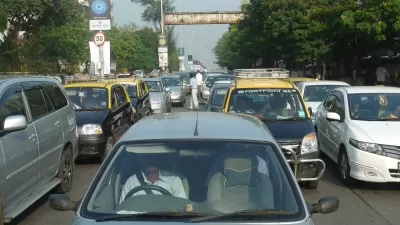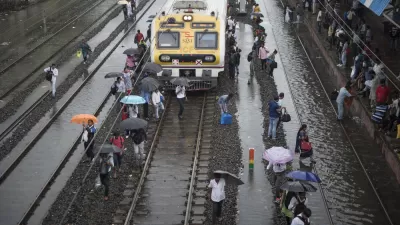Naresh Fernandes chronicles a recent upsurge in events providing opportunities for Mumbai's residents, and fascinated guests, to discuss the city's myriad challenges, and possible solutions. But can all the talk result in real action?
As Fernandes notes, Mumbai's challenges are varied, "an acute shortage of affordable housing that has forced 62 per cent of its population to live in slums, the pressure-cooker conditions in local trains that carry 7.2 million people a day, the severe absence of parks that leaves every 1,000 Mumbaikars with merely 0.003 hectares of open space." Fernandes observes an increasingly varied series of discussions, exhibits, and lectures oriented around identifying and addressing these challenges. What will come of this increased focus, however?
"Despite all the seminars and roundtables and discussions, though, organizers are aware that it isn't easy to convert the ideas they generate into public policy, especially in a city where property developers, the politicians who make the rules for real estate development and the bureaucrats who regulate the murky process often are the same entity," writes Fernandes.
"Change isn't impossible – if it is backed by a lot of effort, insists P.K. Das, the architect who conceptualized the 'Open Mumbai' exhibition on creating more public spaces in the city. Many politicians visited the exhibition and Mr. Das said he hoped they departed with fresh ideas. But most of all, he hoped that the exhibition and the discussions around it will convince Mumbaikars that it is actually possible to find solutions for many of their problems. 'Pressures put on the government by the citizens and their movements will determine our success,' he said."
FULL STORY: ‘Dystopian Future’ Draws Problem Solvers to Mumbai

Alabama: Trump Terminates Settlements for Black Communities Harmed By Raw Sewage
Trump deemed the landmark civil rights agreement “illegal DEI and environmental justice policy.”

Planetizen Federal Action Tracker
A weekly monitor of how Trump’s orders and actions are impacting planners and planning in America.

The 120 Year Old Tiny Home Villages That Sheltered San Francisco’s Earthquake Refugees
More than a century ago, San Francisco mobilized to house thousands of residents displaced by the 1906 earthquake. Could their strategy offer a model for the present?

LA’s Tree Emergency Goes Beyond Vandalism
After a vandal destroyed dozens of downtown LA trees, Mayor Karen Bass vowed to replace them. Days later, she slashed the city’s tree budget.

Sacramento Leads Nation With Bus-Mounted Bike Lane Enforcement Cameras
The city is the first to use its bus-mounted traffic enforcement system to cite drivers who park or drive in bike lanes.

Seattle Voters Approve Social Housing Referendum
Voters approved a corporate tax to fund the city’s housing authority despite an opposition campaign funded by Amazon and Microsoft.
Urban Design for Planners 1: Software Tools
This six-course series explores essential urban design concepts using open source software and equips planners with the tools they need to participate fully in the urban design process.
Planning for Universal Design
Learn the tools for implementing Universal Design in planning regulations.
Ada County Highway District
Clanton & Associates, Inc.
Jessamine County Fiscal Court
Institute for Housing and Urban Development Studies (IHS)
City of Grandview
Harvard GSD Executive Education
Toledo-Lucas County Plan Commissions
Salt Lake City
NYU Wagner Graduate School of Public Service





























